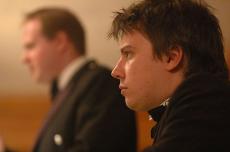Teams debate concept of Israel sanctions

Amelia Moore The Daily Illini
October 6, 2006
For the first time in 30 years, the Illini Union hosted a debate Wednesday over whether the United Nations should sanction Israel for their recent military actions in Lebanon.
The debate pitted the Illinois Policy Debate Team and Illini Speech and Debate Team against the British National Debate Team, which consists of two European Debating Champions.
The event was a “lecture with the organized structure of a debate,” said Atilla Hallsby, Illini Speech and Debate president.
The debate, entitled “Resolved: That the United Nation should sanction Israel for their recent military actions in Lebanon” was moderated by Tim Glass, Illinois Policy Debate coach, and Rich Besel, coach of the Illinois Speech and Debate Team.
Gavin Illsley, a current student at Oxford University and the European Debating Champion, and Fraser Campbell, an alumnus of Oxford University and the former European Debating Champion, represented the British National Debate Team.
Get The Daily Illini in your inbox!
The University was represented by Eric Ranz, sophomore in LAS, and Gail Schnitzer, sophomore in LAS.
The debate was judged by three panelists. The British National Debate Team provided the affirmative perspective and the University the negative.
The debate, which was structured into affirmative and negative critiques, cross examinations and rebuttals, was followed by comments by the panel and an audience-involved discussion.
“The debate provided civilized, intelligent, meaningful discussion,” Glass said, and added that he was “particularly pleased with the audience participation.”
A number of points were raised on both sides. The University team observed that if Israel should be sanctioned for their actions in Lebanon, then “the United States should be sanctioned as well,” Schnitzer said.
“If we do the right thing now then we’ll have to do the right thing all the time,” Campbell said.
The audience added to the discussion, raising the issues of United Nations effectiveness in conflict resolution and the plight of the Lebanese refugees.
The British team recently began a 20-stop tour of the United States which started at Kenyon College in Ohio and is continuing through Virginia and Kentucky. It will eventually go all the way to California and Texas.
“I’ve always been interested in America and American culture,” Illsley said. “This trip provides a fantastic way to see what America has to offer,” he added.
Campbell said that he looks forward to being present for midterm elections and seeing the American political process.
“When we get back to Britain, we’ll tell everybody how hospitable people were and hopefully it won’t be another 30 years until we visit again,” Campbell said.
“Debate is great leveler; it’s not about who has the most supporters, but who can use this neutral forum, where everyone has an equality of arms, to form the best argument,” he said.
The debaters agreed that debate provides an open space for discussion and “forces people to question and evaluate their own beliefs,” Illsley said.
“Debate makes people engage with the other side,” he added
Illini Policy Debate Team President Chime Asonye said that he looks forward to the future of debate and intelligent discourse on campus. “Hopefully it’s the first of many,” Asonye said.
He said that he feels that debate fits well in the campus strategic plan, in that students should strive to make a difference and promote discussion. “Debate is the best synthesis of interdisciplinary research,” Asonye said.
“People are going to leave talking about this,” Hallsby said.






